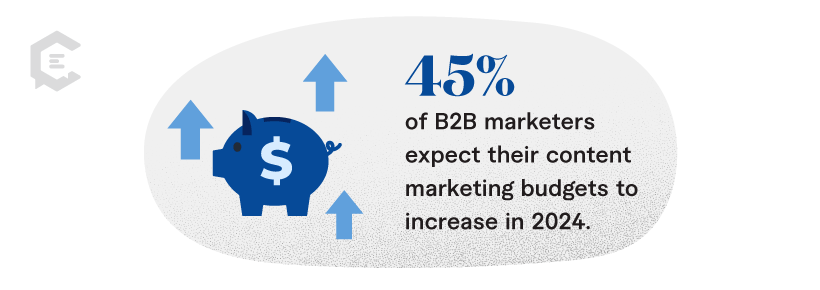There’s always an ideal moment to begin strategizing content budgets. Right?
Well, yes. Even though it may not feel like it. Regardless of the time of year, there are many good reasons to find your moment.
One, a content budget lets you allocate resources more efficiently. It determines how much you can invest in paid ads or tools like marketing automation. Maybe you want a content agency to handle a portion of your entire content strategy so you can focus on other marketing initiatives.
Second, a content marketing budget ensures your content efforts are structured, strategic, and purposeful. You don’t want to waste resources on campaigns that are not well-thought-out.
Thirdly, a well-structured budget allows you to track content ROI more accurately. Earmark specific amounts to different aspects of your strategy, then measure the performance of each to identify areas for improvement or where to allocate more of your resources.
In this guide, we’ll discuss:
- The core components of a content budget
- Common mistakes marketing teams make when creating budgets
- How to align your content budget with marketing goals
- How to optimize your content budget for maximum ROI

Understanding the Core Components of a Content Budget
According to recent data from the Content Marketing Institute, 45 percent of B2B marketers expect their content marketing budgets to increase in 2024. But what comprises a content budget?
Various factors can affect content budgeting, but a comprehensive budget can include elements such as:
- Content creation: Hiring writers, editors, designers, and other content creators
- Content distribution: Paid advertising, social media promotions, and sponsored content
- Search engine optimization (SEO): Tools for keyword planning, content optimization, competitor analysis, backlink analysis, and site audit
- Content management system (CMS): Subscription or licensing, hosting, customization, and other associated fees
- Analytics: Funds for analytics tools and data analysts
- Content upgrades and premium offerings: Creating in-depth content like eBooks or premium content like exclusive courses and webinars
- Social media and community management: Tools for social media scheduling, monitoring, and analytics; funds for community management and engagement
- Email marketing: Email marketing tools and platforms, plus budget for special email campaigns or newsletters
- Events and webinars: Participating in or hosting industry events or webinars, funds for event-specific materials
- Content maintenance and updates: Updating and repurposing existing content, funds for website updates and improvements
- Training and development: Training your team on new content tools or strategies, budget for team members’ skill development
- Testing and experimentation: A/B testing tools, funds for trying out new and experimental content ideas
- Consultancy or agency fees: Hiring external consultants or agencies for specialized services
- Legal review and compliance: Legal review of content to ensure compliance, funds for obtaining rights and licenses for visual assets such as images

Common Pitfalls in Content Budgeting
Content budgeting and personal budgeting may share some fundamental similarities, but they operate on different planes. Among several things they do share — you’re likely to experience pitfalls along the way.
Some content budgeting pitfalls to watch out for:
Underestimating costs
It’s easy to underestimate the costs of creating and distributing content. Maybe you miscalculated resource requirements. Or overlooked hidden expenses. Or failed to account for unforeseen challenges.
These can all lead to budget overruns, which can result in unplanned cutbacks. And when that happens, content quality usually takes the brunt.
So what can you do? First off, conduct thorough research during the budgeting process. Consider all aspects of content creation, such as production costs, software and tools, talent fees, and distribution expenses. Then, make sure to add a buffer for unexpected expenses to keep your budget stable.
Neglecting measurement and analytics
Metrics and analytics exist for a reason — they help you assess the effectiveness of your content initiatives so you can make better budgeting decisions the next time. However, some content teams may neglect the importance of these tools, either due to overemphasis on creativity, resource constraints, or, in some cases, a lack of awareness.
To avoid this pitfall, use tools that provide insights into key performance indicators (KPIs) relevant to your content strategy. Regularly monitor metrics such as conversion rates, engagement, traffic, audience growth, cost per acquisition, and ROI. These help you understand how your content initiatives are faring. Use the data to refine your content strategy and allocate your budget more effectively.

Aligning Your Content Budget with Marketing Goals
Aligning your content budget with marketing goals ensures you have the resources necessary to execute your content strategy and maximize its overall impact.
Setting realistic budget objectives
“Realistic” is the operative word here. And that starts with setting realistic marketing goals. What is this campaign trying to achieve? Increase social media engagement by 20 percent? Generate 500 leads via a new eBook?
Once your objectives are covered, you can start creating a budget supporting those overall goals.
Balancing short-term and long-term investments
Make sure to account for both long-term and short-term goals in your budget.
Short-term spending may focus on immediate returns, such as quick leads or sales, while long-term investments may involve building brand equity, fostering customer loyalty, and expanding market share, which all contribute to sustained growth and a strong market presence.
Optimizing Your Content Budget for Maximum ROI
You want the most bang for your buck when it comes to marketing dollars. To achieve maximum ROI on your content budget, consider these two key strategies:
ROI-focused spending
Prioritize spending on initiatives and channels that yield the best ROI. To determine which to focus on:
- Analyze the performance of various marketing campaigns to pinpoint the most effective approaches
- Identify the channels that generate the most leads or conversions, such as social media, SEO, or email marketing
- Implement conversion-tracking mechanisms — for example, UTM parameters and conversion pixels — to accurately attribute success to specific content efforts
- Allocate part of your budget for testing and experimenting with content messaging, content formats, and distribution channels to identify the best strategies
This way, you can ensure your budget goes to activities that contribute the most to your overall marketing success.
Continuous budget review and adjustment
Consumer behavior evolves in response to various factors, including advances in technology, economic conditions, and cultural shifts. It’s important that you structure your budget in a way that allows you to agilely respond to changing market dynamics. This means adopting a mindset of continuous review and adjustment:
- Regularly assess content performance using KPIs
- Plan for future trends and anticipate industry shifts to stay ahead of the curve
- Reallocate resources based on real-time market insights and feedback from your customers and team

Supercharge Your Content Strategy With Strategic Budgeting
If there’s anything that can derail even the most well-planned content strategy, it’s the budget. A poorly defined budget limits your ability to maximize the effectiveness of your campaigns. Remember the above pointers when it’s time to sit down and start working on your budget.
Need help optimizing your content strategy? Reach out today for a personalized content strategy session. Let’s ensure your budget aligns with your goals!



